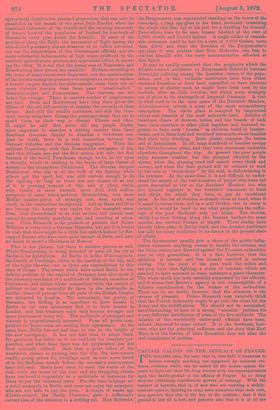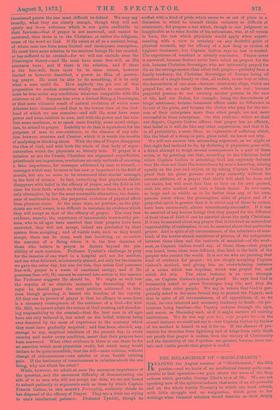CAPTAIN GALTON ON THE EFFICACY OF PRAYER.
THE scientific men, the men, that is, who hold it weakness to believe strongly anything not supported by material evi- dence, evidence which can be tested by the senses, appear dis- posed to fight out their life-long contest with the superoaturalists upon the battle-ground of the efficacy of Prayer. In so doing they are exhibiting considerable powers of strategy. With the instinct of heretics, that is, of men who are resisting a widely- received opinion, fighting an army more numerous than their own, they perceive that this is the key to the position ; that if this ground is lost all is lost, and perceive also that it is of all the
threatened points the one most difficult te'defend. We may say broadly, what they see clearly enough, though they will not openly say it—a reticence which is not quite creditable to their fairness—that if prayer is not answered, and cannot be answered, then there is in the Christian, or rather the religious, sense of the word no God. If He exists at all as a sentient being, of whom man can form some limited and inadequate conception, He must have some relation to the sentient beings He has created, or has suffered to be created—for we will not exclude even the Demiurgus theory—and He must have some free-will, as His creatures have ; and if there is the relation, and if there is the free-will, there must be to some extent, however limited or however described, a power in Him of answer- ing prayer. He must be able to do something, if it be only what a man could do. How anybody can get out of that proposition we confess ourselves wholly unable to conceive. It must be true under any conditions whatever compatible with His existence at all. Suppose him even a limited Being, a Demiurgus, or that mere ultimate result of natural evolution of which some Atheists have dreamed—and that is the lowest view of the God- head of which we can conceive—and still He must have some power and some relation to men, and with the power and the rela- tion some readiness, or to speak more frankly, some moral obliga- tion, to attend to prayer. Inability to do that is equivalent for the purposes of man to non-existence, to the absence of any rela- tion between creature and Creator, which it is worth the trouble of analysing or thinking about. With the idea of Prayer disappears the idea of God, and with both the whole of that body of super- naturalism which the physicists so bitterly hate. If prayer is a delusion so are the Creeds, Churches are organised superfluities, priesthoods are impostures, revelations are only methods of securing a false importance, for messages addressed by man to himself,— messages which may be more or less new or important in the field of morals, but are no more to be reverenced than similar messages in the field of science. In fact, everything that physicists dislike disappears with belief in the efficacy of prayer, and the field is left clear for their faith, which we freely concede to them is, if not the only alternative, by far the most reasonable alternative, the domin- ance of unalterable law, the perpetual evolution of physical effect from,physical cause. At the same time, no position, as the phy- sicists are well aware, is so difficult to maintain by evidence which they will accept as that of the efficacy of prayer. The very beat evidence, namely, the experience of innumerable trustworthy per- sons, who in all ages have asserted that their prayers have been answered, they will not accept, indeed are precluded by their system from accepting ; and of visible tests, such as they would accept, there can be none, such test involving ex necessitate the coercion of a Being whom it is the first doctrine of those who believe in prayer to declare beyond the pos- sibility of such coercion. Professor Tyndall's challenge to pray for the inmates of one ward in a hospital and not for another, and see what followed, is inherently absurd, not only for the reasons we gave the other day, but also for this, that unless God possesses free-will, prayer is a waste of emotional energy, and if He possesses free-will, He cannot be coerced into action in the manner the Professor suggests He should be. We might as well test the royalty of an absolute monarch by demanding that if royal he should grant the next petition addressed to him, even though granting it denied the freedom of his royalty. All that can be proved of prayer is that its efficacy in some form is a necessary consequence of the existence of a God—for with Mr. Mill, we cannot admit the notion of God creating and abandon- ing responsibility to the created—that the best men in all ages have not only believed it, but acted on the belief, without being ever deterred by the mass of experience to the contrary which they must have gradually acquired ; and that keen, shrewd, nay, strange to say, sceptical intellects of the present day, in every country and under every condition, assert that their prayers have been answered. What other evidence is there or can there be for an assertion which most physicists credit, but which many would declare to be quite incredible, that the will—mere volition, without change of circumstances—can subdue or even banish existing pain. If the testimony of consciousness is valueless about the one thing, why not about the other ?
While, however, we admit at once the enormous importance of the question, and the enormous difficulty of demonstrating our aide of it to men who will not accept our data, we are not bound to submit patiently to arguments such as those by which Captain Francis Gallon, in this month's Fortnightly, evidently thinks he has disposed of the efficacy of Prayer. They are a little too trying to one's intellectual patience. Professor Tyndall, though he scoffed with a kind of pride which seems to us out of place in a discussion in which be himself thinks certainty so difficult of
attainment, did propose a test which, though in our judgment so inapplicable as to raise doubts of his seriousness, was, at all events in form, the test which physicists would apply when experi- menting with a view to certainty on any doubtful point of physical research, say the efficacy of a new drug or system of hygienic treatment ; but Captain Galton says no test is needed.
The experience of mankind is already conclusive. Prayer never is answered, because doctors never have relied on prayers for the sick, because Christian Sovereigns who are universally prayed for die on the average sooner than other rich people,—probably from a family tendency, the Christian Sovereigns of Europe being all members of a single family or clan, all in fact, in one way or other, the descendants of one man—because missionary ships, which are prayed for, are no safer than slavers, which are not ; because prayerful persons do not outstrip secular persons in the race of life, half our Dukes, for example, being the descendants of kings' mistresses ; because insurance offices make no difference in favour of the pious, and because the clerics who pray for the suc- cess of their enterprises more than other people are not more successful in those enterprises. On this evidence, which we shall not dispute, Captain Galton affirms that prayer has no efficacy, that belief in it will die like any other superstition, and that it is, in all probability, a mere bleat, an expression of suffering which, like the bleat of a sheep in pain, gives relief, we know not why. We will not answer this astounding argument, as we might at first sight feel inclined to do, by declaring it physicism gone wild, a direct attempt to weigh mental consequences in a pair of brass scales, or by pointing out that, according to the Christian belief which Captain Gallon is attacking, God has expressly declared that He does not limit His benevolence by men's deserving, raining equally on the just and unjust, or by asking Captain Galton for proof that his pious persons ever pray earnestly without the earnest addition of a prayer that God's will shall be.done and not theirs, but will meet him face to face on his own ground, with his own method and with a blank denial. In two cases, so large and so visible as to be better than any of his own, persons about whom the presumption alike of prayer and of a prayerful spirit is greater than it is about any of those he names, have been enormously, almost miraculously successful. if it can be asserted of any human beings that they prayed for the diffusion of their ideas of faith it can be asserted about the early Christians. If it can be asserted about any prayer that it involved an antecedent improbability of realisation, it can be asserted about that particular prayer. And in spite of all circumstauces, of the reluctance of man- kind, of the horror-struck resistance of princes, of the antagonism between those ideas and the instincts of mankind—of the weak- ness, as Captain Gallon would say, of those ideas—that prayer was heard, those ideas were diffused, that faith is the faith of the peoples who control the world. It is not we who are pressing that kind of evidence for prayer ; we are simply accepting Captain Galton's method, and giving him an overwhelming instance of a cause which was hopeless, which was prayed for, and which did win. The other instance is an even stronger one, on Captain Galton's system of proof. He says that God is
incessantly asked to grant Sovereigns long life, and they die quicker than other people. We say in return that God is per- petually asked in the same formal way to protect the Papacy, and that in spite of all circumstances, of all oppositions, of, as we think, its own inherent and necessary tendency to death—its pre- tensions being baseless—the Papacy endures through the ages, and seems, as Macaulay said, as if it might survive all existing institutions. We do not say post hoc, ergo propter hoc—in the
second instance we could not say it—but Captain Gallon by the law
of his method is bound to say it for us. If the absence of pro- tection for churches from lightning and of kings from early death are proofs that prayer is useless, then the victory of Christianity and the durability of the Popedom are greater, because more cer- tain and visible proofs that prayer is useful.



































 Previous page
Previous page